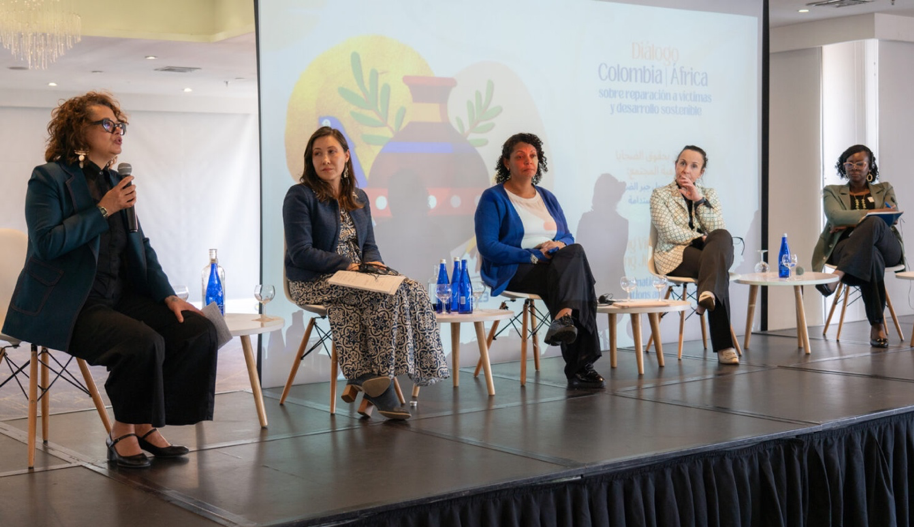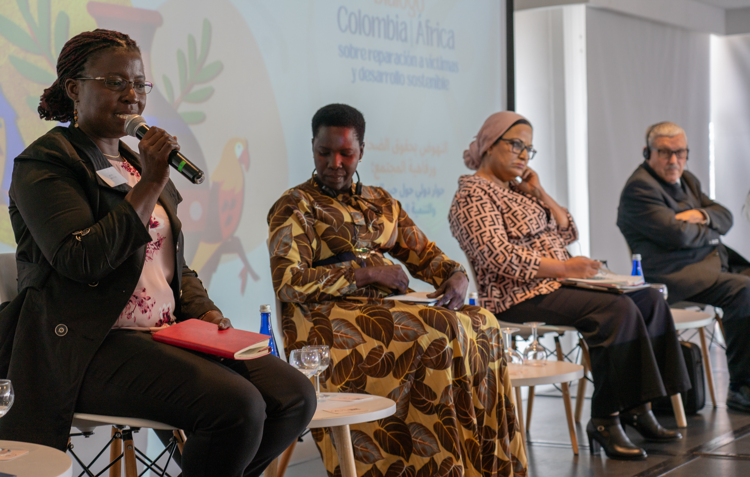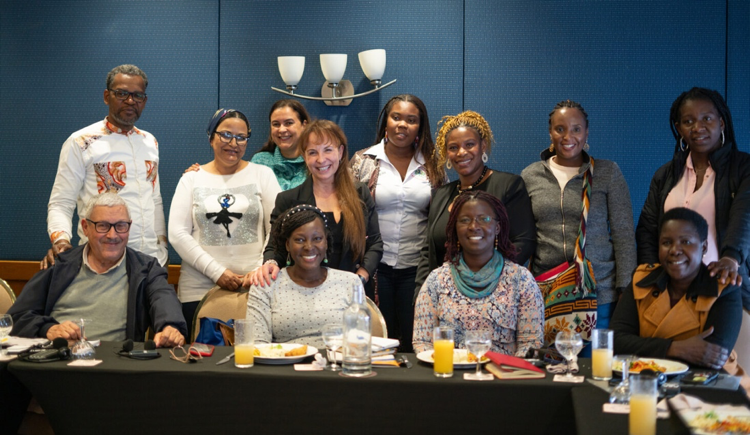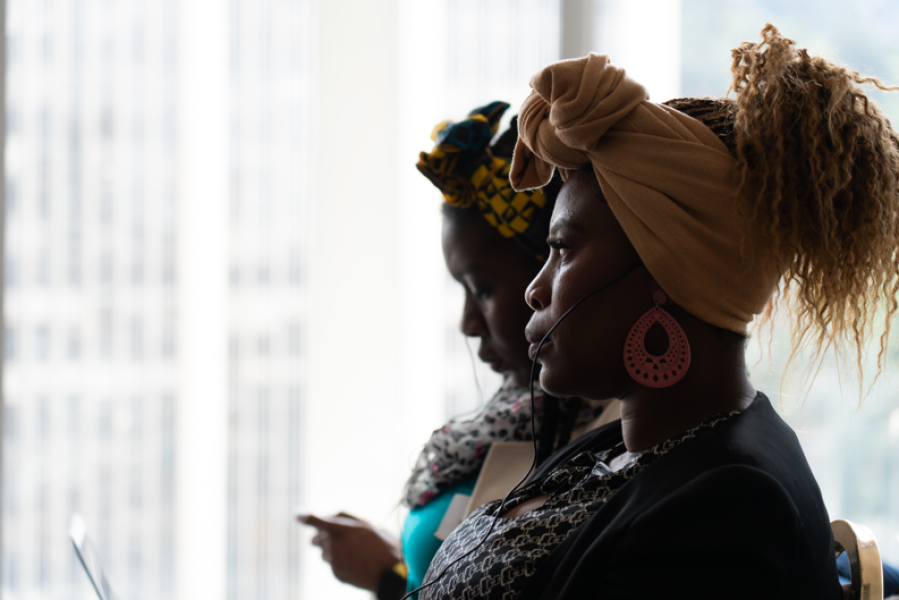On November 28, 2023, ICTJ organized an international dialogue in Bogotá, Colombia, to share innovative strategies for advancing victims’ rights to redress for human rights abuses and for establishing more victim-centered development policies. The global event was made possible with support from the Wellspring Philanthropic Fund and, in Colombia, from the governments of Norway and Sweden. The gathering also marked the official launch of ICTJ’s new report—Advancing Victims’ Rights and Rebuilding Just Communities Local Strategies for Achieving Reparation as a Part of Sustainable Development—which presents findings from a two-year comparative study of local efforts in Colombia, The Gambia, Tunisia, and Uganda to advance reparations.
The daylong event brought Colombian government officials, international policymakers, academics, and transitional justice practitioners together with leaders of victims’ groups and civil society organizations and researchers from victim communities most affected by violence and marginalization in the countries featured in the study. They included representatives from Colombia’s Cauca province and its Pacific seaport Buenaventura and from the San Basilio de Palenque municipality in the north, from the conflict-affected region of Northern Uganda, and from Tataouine and Sidi Bouzid, marginalized regions in Tunisia.
The event opened with remarks by Maria Camila Moreno Múnera, director of ICTJ’s office in Colombia, followed by addresses by Elizabeth Taylor Jay, vice minister of multilateral affairs from Colombia’s Ministry of Foreign Affairs, and Anna Myriam Roccatello, ICTJ’s deputy executive director and director of programs.
The conference was the first African-Colombian dialogue on reparations and sustainable development and highlighted many of the study’s findings. “Even if the experiences in each context are different, we see that those affected are asking themselves the same questions and are motivated by the same concern: how best to advance and guarantee justice, truth, and reparations in their respective countries,” said Ms. Moreno at the start of the landmark event.
The cross-cultural exchange delved into the findings and recommendations presented in ICTJ’s new report and deepened and expanded on the report’s major themes. The event was livestreamed and is available online in English and Arabic.
Victim-Centered Development Initiatives That Enhance Reparations and Address Structural Injustice and Inequality
Worldwide, millions of victims of serious human rights and humanitarian law violations await justice and redress for the harms they suffered, with many dying before receiving any form of acknowledgment or compensation. Victims and civil society representatives from all countries echoed this concern during the conference.
While the reasons for the failure to deliver reparations vary by context—which can include insufficient resources, limited institutional capacities, and a lack of understanding about reparations—the survivors of human rights abuses experience similar, devastating daily challenges including serious and long-term physical and psychological injuries and social and economic barriers. Development programs can offer some relief to survivors. However, affected societies often face significant obstacles to development or the approach they take to development is insufficiently victim centered and therefore limits the reparative potential of such programs. Failing to redress the ongoing impacts of past violence can lead to a recurrence of violence.

The repercussions of violence in a society are issues of national and international concern. The responsibility to address them should not fall only on transitional justice processes but also on the wider network of institutions working to build just and inclusive futures through reparations, development, and reform measures. Distributing responsibility across institutions helps to increase the potential to address poverty, marginalization, and inequality and bring much-needed transformational change to the people and communities who endured human rights abuses.
As Ms. Roccatello explained in her address, “we can’t continue operating by enacting and implementing reparations and other transitional justice programs separately from broader sustainable development and prevention goals.” In fragile contexts, every new transitional justice- or development-related initiative, program, and policy has its place and a role to play in bringing about change. If one process is out of step with another or demonstrates an underlying unwillingness to pursue accountability or acknowledge the harms caused, it can undermine the entire effort to redress past violations. “As such, a political decision to develop the society cannot divorce itself from considering and integrating the perspective of those who have suffered the most because of violence, discrimination, marginalization, and inequity,” Ms. Roccatello continued.
While there are over 9 million registered victims of Colombia’s 50-year armed conflict, only 14 percent of them have received reparations. “Colombia is a very different country since the signing of the peace agreement in 2016” and “has advanced in many important areas,” explained Ms. Moreno. But, much work remains to be done there to achieve a “longstanding and just peace.”
The regions and communities most affected by the conflict in Colombia are often those where Afro-descendants live. In these contexts, steps toward a long-lasting and just peace must also include redress for structural racism and marginalization, which have contributed to past and ongoing violence, as well as reparation for historical harms caused by colonialism.
Colombia’s comprehensive transitional justice process is innovative and takes a broad approach to justice for victims. For instance, the Special Jurisdiction for Peace (JEP)—the criminal justice tribunal dedicated to handling crimes committed during the conflict—incorporates restorative and reparative elements in its procedures, such as guarantees for victim participation in the proceedings and restorative sanctions for perpetrators.
“This in itself is not enough,” however, stressed Ana Manuela Ochoa, magistrate of the JEP’s Acknowledgment Section. “We need other measures to take victims out of the situation that they were brought into because of war.” Marianne Akumu, program associate in ICTJ’s office in Uganda, shared a similar reflection about the ongoing criminal proceedings related to crimes committed during the war in Northern Uganda before the International Criminal Court and the High Court of Uganda’s International Crimes Division. These cases reach only a small number of victims, and “within the context of larger poverty and inequality,” she asserted, they are inherently insufficient.
According to Vice Minister Elizabeth Taylor Jay, what is required is an unwavering commitment to achieving peace and delivering reparations to victims, as well as a “proactive focus on structural reforms and social programs that expand economic opportunities to rural areas and provide priority services to our most vulnerable communities” consistent with “our commitment to the 2030 sustainable development agenda.”
Collective Reparations That Respond to Collective Harm
Discussions at the conference about reparations underscored the lasting repercussions of conflict and human rights abuses on affected communities. Collective approaches to reparation that redress collective harm offer opportunities to develop synergies between reparations and development that may help to reduce obstacles to development in marginalized regions while also meeting victims’ needs.

As Roger Duthie, ICTJ’s senior expert for research, said, “This is clear from the priorities that victims express as well as the forms of reparations that truth commissions recommend and that administrative programs can provide. While compensation is usually a priority for victims, material reparations can also take the form of health care services, psychosocial support, livelihood support, employment opportunities, housing land, and education.” At the same time, he continued, “collective reparations for communities and regions [can take] the form of infrastructure and reconstruction, hospitals and clinics, schools, environmental programs, and other community development projects.”
Collective approaches to reparation, asserted Salwa El Gantri, head of ICTJ’s Tunisia program, are crucial in contexts like Tunisia, where, in addition to “recurrent violations” of civil and political rights, there have been violations of social and economic rights over decades of repressive dictatorship and through the imposition of neoliberal development policies that led to widespread unemployment and poverty. Tunisia’s Truth and Dignity Commission recognized “victim regions” that the previous regime directly targeted for destruction, marginalization, and exclusion and outlined a range of recommendations to repair the resulting harm to individuals and communities in these regions. Unfortunately, though, those affected in the victim regions have not yet received reparations.
In Colombia, the government’s longstanding approach to some outer territories has similarly hindered local development and collectively harmed inhabitants. Keinel Yoel Simarra from San Basilio de Palenque in northern Colombia—a community of descendants of enslaved Africans that the Victims and Land Restitution Unit has recognized as entitled to collective reparations—stressed that reparations initiatives must consider the historic victimization of regions and communities beyond the armed conflict. “If we don't take this into account, the reparations offered are minimal compared to our community needs,” he said.
Victim-Centered Approaches and Collective Action Led by Victims and Diverse Civil Society Actors
Despite the many challenges victims confront in their lives, “victims do not give up,” explained Didier Gbery, head of ICTJ’s Gambia program. “They use their tenacity, they use their ingenuity, they also innovate,” consistent with “their skills, their capacities,” and the “opportunities offered to them in their context.” According to victims and civil representatives from all countries at the conference, this resilience and innovation are critically important.
In Uganda, victims have long demonstrated indefatigable resolve and creativity. While the government has established a legal and policy framework for reparations, it has not yet passed the necessary legislation to implement this framework. Thus, tens of thousands of victims of the decade-long armed conflict in Northern Uganda continue to grapple with the consequences of war crimes and gross human rights abuses, including intergenerational social and economic hardships, almost 20 years since the conflict ended.

In the absence of government action, local actors in Uganda have stepped in to provide direct support to victims and affected communities. Sylvia Acan of Golden Women Vision spoke about her organization’s use of innovative strategies such as music therapy to assist survivors in 29 different communities in the region. “We involve different people to come in and share their stories and out of the story we get a rhythm and create a song,” she said. “It heals our minds.” Local radio stations have broadcast these songs, exposing thousands of people to their powerful messages of peace and justice who would have not otherwise heard them.
In The Gambia, local organizations in partnership with ICTJ and others have undertaken art, music, and radio initiatives to encourage victims’ participation in the country’s transitional justice processes. In Colombia, similar initiatives have been used to help vulnerable groups such as Afro-Colombian women and children better identify and respond to their differentiated needs and overcome social and economic barriers including stigmatization. “It is very important that as women we come up with our own tools for prevention, protection, and services related to violence,” said Gloria Bermudez of the Afro-Colombian Women Association of Northern Cauca. “For us, nothing has ever been easy: We must resist, persist, and never desist.”
Individual victims and survivors, members of victims’ groups and networks, and other local civil society actors can and are using collective action across their respective countries to advocate for, shape the design of, and help implement reparations programs. This collective action can include coordinating outreach, mobilization, and other activities, as well as sharing information and expertise. This action can help build alliances and coalitions among diverse actors with a range of mandate, strengthen social cohesion, and ensure reparations initiatives address historical injustices and underlying root causes such as marginalization and contribute to sustainable development.
__________
PHOTO: Members of a women’s organization from Cauca, Colombia, listen intently to a panel discussion at the ICTJ-organized dialogue in Bogotá. (Maria Margarita Rivera/ICTJ)
